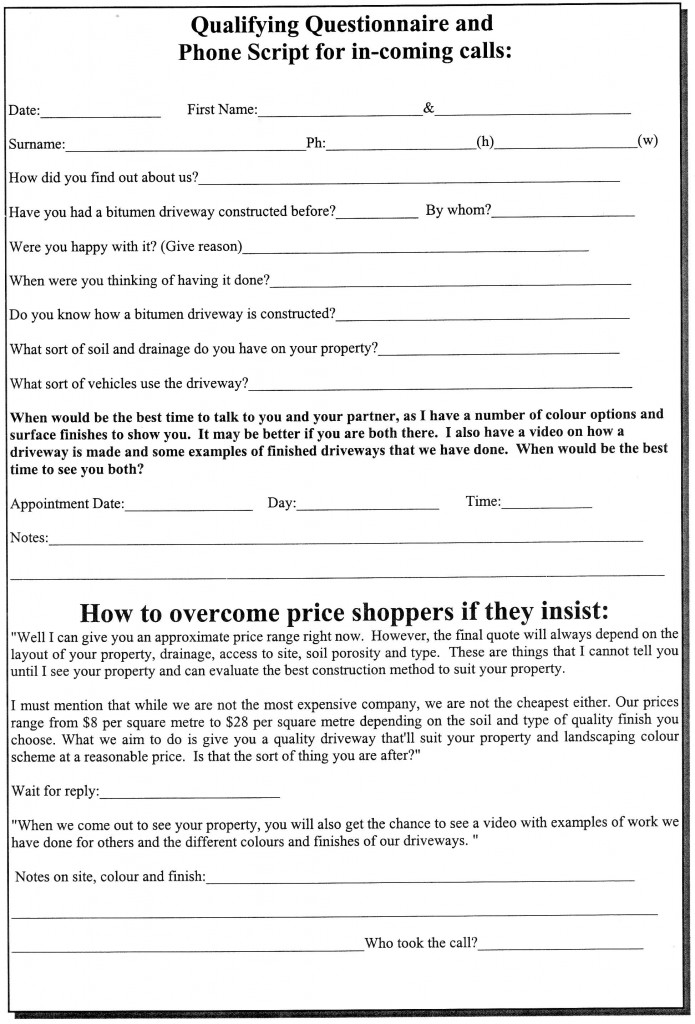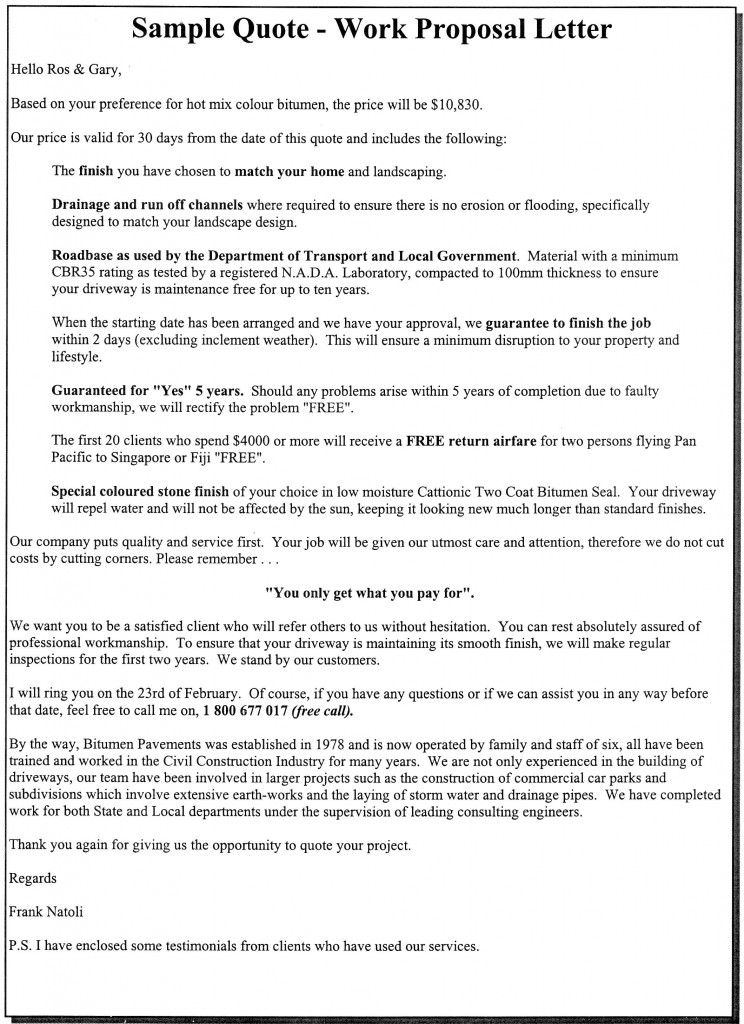How to Turn ‘Price Shoppers’ Into Profitable Sales
How to Turn
‘Price Shoppers’ Into Profitable Sales
Even if your prices are higher than your competitors’
Recently I’ve discovered an overlooked area that has even greater potential to rake in the loot. Now, I want you to sharpen up and pay close attention. Did you ever wonder if, maybe, you are overlooking something vitally important in your business? If you are like most people, there is a huge and vitally important area of your business that you probably aren’t exploiting. Of course, what I am talking about, is converting more of the inquiries your business is already getting into profitable sales.
This is such an undeveloped area in most businesses, that if you get it right, it can flip your sales graph right off the page. No kidding. I’ve just got the results from one of my clients who applied two simple methods I taught him, and increased his sales by 1000%. This adds up to $48,000 per week in hard dollar terms.
He used to get one sale from 20 inquiries – and now he gets 10 sales from 20 inquiries. What’s really interesting, is that he charges 10 to 15% more than any of his competitors.
So how is this possible? The clue to this secret lies in a little known study that shows …
… only 10% to 20% of people will buy on “price” only.
The other 80% to 90 % are looking for value.
In other words, they want the product or service that’ll solve their problems at the best possible price and there is an easy way to turn all the phone and walk in inquiries into profitable sales. The key to getting their business is simple …
You must have a system to find out what’s important to them,
before you give them a firm price (or quote) on anything.
You first have to show them that you understand their situation well enough, to give them a product or service that will meet their needs. They want to be sure that what you will do for them will be worth the money they will pay you.
To find out what solutions these potential customers really want, you must ask questions. Lots of relevant questions. Plus, you must decide beforehand what action you want this person to take next. Is it to get them to test drive the car, if you are a car dealer? Is it to get them to come into your office or factory, if you are a professional or a manufacturer? Is it to get an appointment for yourself in their home or business to see what needs to be done, if you are a tradesman? Or is it to make the sale there and then, if you are a retailer?
Whatever your plan, that’s all you want to achieve at this point. To do this successfully, you and your staff must have a system. It should be in the form of a written qualifying questionnaire or phone script that everyone follows. These structured questions will show the prospect that you care about their situation – and get around the famous ‘price shopper’ question … “How much is your …”. Handling it this way will set you far apart from all your competitors. You can bet they won’t be using these techniques.
I’ll show you how we did it for a bitumen driveway construction business. A very ‘price competitive’ business according to the owner. A person calling from the telephone book asks you the typical question, “Could you tell me how much a 100 meter driveway will cost me?” This question sends most people scurrying for their price books. They give the price and the person says “Thanks very much, I’ll get back to you.” And, in most cases, you never hear from them again. The average success rate with this sort of approach is about 10% – if your price is one of the low ones. If you charge more, like our bitumen driveway friend, it may be less.
But how can you get around answering their question about price? Actually, it’s very easy. You really can’t accurately answer it anyway, can you? Not without knowing more about the work and seeing their home. After all, they may want special drainage, landscaping or other extras you don’t know about. They may have a problem with flooding or whatever and even though in your business the situation may be slightly different, the skilful person asking the right questions will get more sales for every business – including yours.
Let’s see how the bitumen driveway business person could handle it. They could ignore the price question and reply, “Certainly, what area are you in?” – “How did you get our phone number” – “What sort of cars will be using this driveway?” – “How long do you want it to last?” – “When did you want it done?” – “What sort of drainage is there?” – “Have you had a bitumen driveway constructed before?” -“If yes, by whom and were you happy with it?” and so on.
Or you could say, “(Their name), before I can answer that I need to ask you a few questions, so I can better understand your needs. Once I understand what your needs are, and if I am able to help you, I’ll give you a firm price”.
After all, you may not have what they want in some cases!
But what to do if they insist?” What if they say, “I just want the price.”? Well, you could reply “Peter, the price will range anywhere from $1,000 to $3,500 depending on the final site inspection and the quality. Was that the price range you had in mind?”
And then you follow up with … “To give you a firm price, I’ll need to ask you a few questions, do you have a moment?” Of course, you should never give a firm price over the phone. Why not? Because you will probably never hear from the person again. That’s why. Your chances of getting the job on price alone will depend on the skill of the other people they call and how many other companies they call. You must be in control.
The sale you want to make, is an appointment with the person at their home.
Quite frankly, if they won’t let you come to their house to meet you, they probably aren’t serious about getting it done anyhow.
But what if you don’t have a bitumen driveway business? What questions should you be asking? Well, my friend, I have some good news for you. There are 10 or 11 questions that can be used for virtually any situation. Let me share them with you …
1. Have you dealt with us before? How did you hear about us? These questions let you monitor where your customers are coming from. By knowing this, you can focus your resources on the promotions and ads that work and avoid the ones that don’t.
2. What do you currently have or use? Where did you get it from? They may already own a similar product, or have done so in the past. By knowing where they purchased it from you may get an idea of the price they paid the last time.
3. What do you like best/least about what you currently have? What would you like to have? This may give you clues as to what qualities they like or dislike in their existing product or service and what they want from their new one. You can then focus on highlighting the same benefits in what you are offering.
4. What is your time frame, when do you want it? If they are not ready to buy, you may be wasting your time by going further. If that’s the case, you may want to say to them, “Because prices, models, service availability etc., change often it may be better to talk with you in ________ months”.
5. How long do you want it to last? Are you planning to sell in the future? If they are looking for a short term solution, they may not wish to pay a higher price for a good quality solution to their needs. This may help you when deciding what product or service to offer and at what price.
6. Who will be using this product or service? Who else is involved in the final decision? You want to know who else you need to consider when presenting your product or service. If they have a partner, wife, husband or accountant who will have a say in the decision to buy, you want to present your product and/or service to both of them.
7. What else have you been looking at? Again, this will give you an idea of what you are up against.
There you have it. Adapt these questions to your business and watch your sales climb. But before you do, let me reveal the other part of the secret of selling more at higher prices. This will help you when you are doing a ‘quote’ or giving them the final price. Remember,
don’t ever just give the price and details of the product or service, without also
explaining what it will do for them and why they should buy it from you.
That’s where your little questionnaire comes in handy. Because you, being a smart little cookie, will look at what they told you they wanted when you asked them the questions and put the very same things that are important to them in your proposal to them.
If you’re selling swimming pools and they said they want a pool that’s easy to clean, you may put in your proposal, “Our _______ pool has a special finish that makes it easy to clean.” Or, if they say they want one that’s safe for kids, you may write, “Plus it is specially designed to be safe for your children.”
Or, if you’re selling clothes and the person wants something that’ll last and look good, you may say, “This suit is made from ………….fabric, it’s especially long wearing and will look like new for years.” Etc., etc., etc.
How sincere. How thoughtful. How clever. How slick … How EFFECTIVE!
I urge you, use these ideas in your own marketing endeavours. You may have to modify and twist them around a bit to fit your personal business but … it will work for you and … work like crazy.
Questionnaire survey: This questionnaire and phone script has resulted in a 95% appointment rate. When the customer was given the letter on the next page, a conversion of 10 out of 20 proposals was achieved, at prices 25% to 50% higher than their competitors.
Quote letter: Ten out of 20 people accepted this proposal. This compares to one job out of 20 quotes, when the quotes were given on the back of their business card or quote sheet. (The original letter has been reduced to one page in this example.)







Leave a Reply